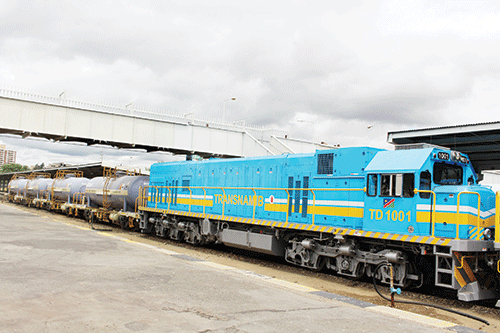President Mokgweetsi Masisi of Botswana has called for urgent action to address pending matters to speed up the implementation of the Trans-Kalahari Railway line link.
During a three-day state visit to Namibia last week, he said the project must be fast-tracked as both countries are losing on its potential of the project.
“It is imperative that we quickly address all pending matters to expedite the commencement of the project without delay,” Masisi said. The Trans-Kalahari Railway Project holds immense potential for regional development, trade and connectivity.
In 2010, Namibia and Botswana signed an agreement to establish the Trans-Kalahari Railway line link. In 2014, the two countries inked a bilateral agreement to establish the approximately 1500-kilometres railway.
Towards the end of 2022, the two countries reaffirmed their commitment to the development of the multibillion-dollar project, which aims to link Botswana’s rich coal fields to Namibia’s world-class port of Walvis Bay.
Transport authorities from Namibia and Botswana who convened for a special joint ministerial committee (JMC) meeting on the project at the end of last year, stated that the construction of the project would begin in January 2025.
Its aims to connect Botswana’s Mmamabula coal fields to the Port of Walvis Bay in Namibia. Once completed, it is going to enhance connectivity for other countries in the region while improving freight rail services, creating jobs and stimulating southern Africa’s economic growth.
The 1500km railway line is envisaged to run from Mmamabula towards Phuduhudu in Botswana, following the Trans-Kalahari Highway through the Mamuno border post into Namibia via Gobabis, Windhoek, Okahandja and then on to Walvis Bay.
The two countries have pledged to grow freight volumes between Walvis Bay and Gobabis to support imports and exports for Botswana with the support of the dry port, and to increase the viability of the rail project.
Speaking during a forum for public enterprises CEOs in Windhoek last week, TransNamib CEO Desmond van Jaarsveld said ministers from both countries recently signed off the timeline for the bilateral railway line project.
“In Namibia alone, we need to focus on regional integration. The rail needs to work together with road transport. We don’t want to eliminate the trucks. In fact the intermodal opportunities are vital for us,” Van Jaarsveld noted.
TransNamib
Meanwhile, after years of running around to secure funding for a turnaround strategy, national rail operator TransNamib has finally penned a long-term loan of N$2.6 billion to implement its five-year business plan. This agreement comes as TransNamib battles to for profitability amid efforts to plug its bleeding balance-sheet and stabilise revenue-generation.
The State-owned rail operator eventually secured the much-needed loan from the Development Bank of Southern Africa (DBSA), in partnership with the Development Bank of Namibia (DBN).
The funding stems from the 2019 Investment Summit held in Windhoek, where the DBN and the DBSA jointly pledged N$8 billion towards infrastructure development in Namibia. Among this was the pledge of about N$2.6 billion for TransNamib.
Furthermore, at last week’s forum, Van Jaarsveld said the company is currently off the rails because it is ultimately failing to fulfil its mandate.
“We have way old-aged rolling stock; the oldest locomotive we’ve got is 53 years old. With the funding, we will procure new locomotives, which will start very soon. There is a lead time of 24 months plus, but we are working on the 24-month interim solution,” the CEO stated.
However, a disappointed Van Jaarsveld admitted that in its current state, TransNamib is failing to service customers sufficiently. As an example, he noted the national rail operator currently only transports 14% of the total fuel requirements for the country.
He said this and other obligations need to be increased significantly for TransNamib to become relevant again. -mndjavera@nepc.com.na


